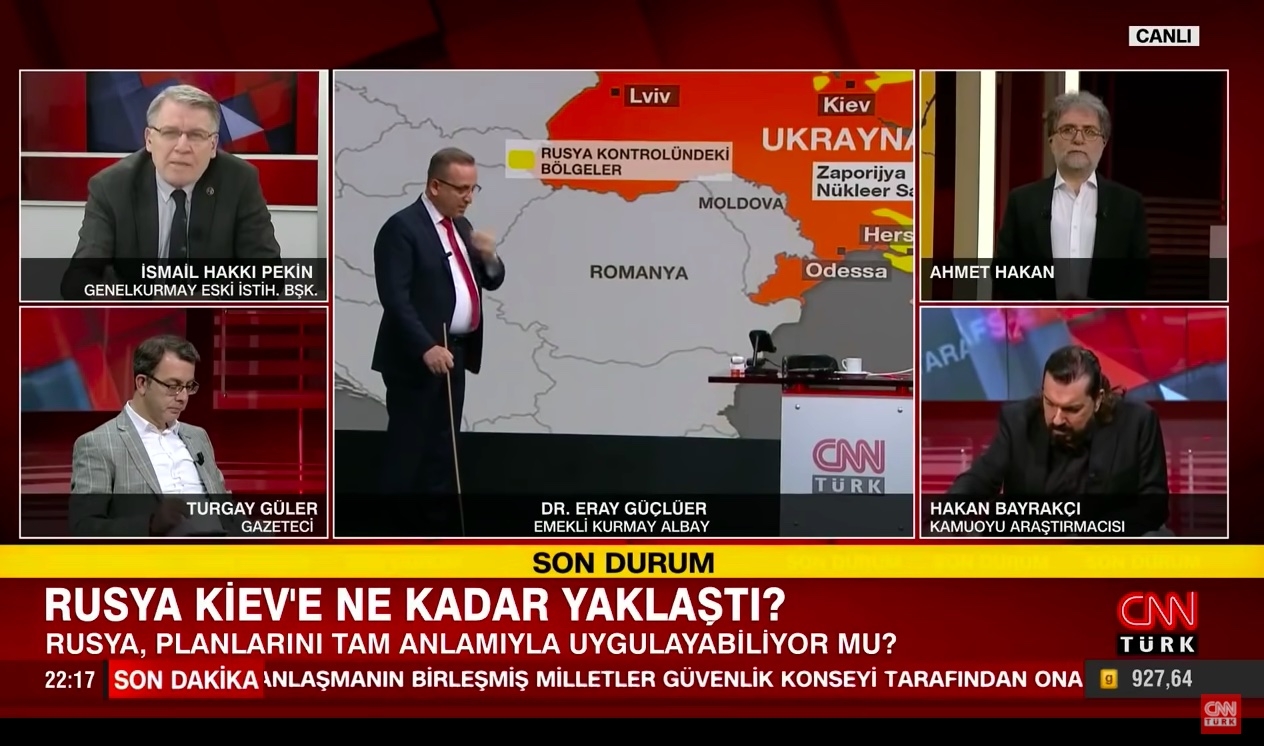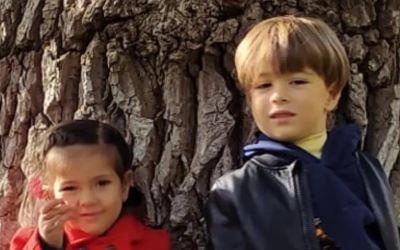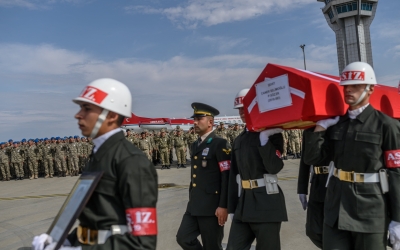Russia-Ukraine war: Turkey's talk show generals sway public against Nato

The Russian invasion in Ukraine has split Turkish society, with mainstream media featuring retired generals and commentators who blame the war on Washington and Nato’s eastward expansion.
Turkey has continued to deliver armed drones and ammunition to Kyiv since the beginning of the war in February, and officially criticised Russia’s invasion as “illegal”.
Yet its largely government-aligned television stations have mostly featured Turkish nationalist pundits, who distrust Nato and the United States and believe Russia was provoked by western intelligence services into the war and is itself a victim. Around 61 percent of Turkish people consume news through televisions.
One well-known admiral saluted the Russian military operation in Ukraine as “a step to end the imperialist Atlanticist” age, and another claimed that Moscow was tricked into the conflict so it will be weakened for years to come.
Some pundits asserted that Russia’s victory in Ukraine would embolden Turkey, others said that Moscow wasn’t massacring people and was in fact opening an opportunity for peace by not seizing Kyiv, despite Russia's military clearly failing to capture the city.
The Turkish public has always been aware of the existence of so-called Euroasinists - nationalists who see Turkey's aims and geography linked to Russia and China - within the senior ranks of the armed forces. But this time all the retired generals and colonels appearing on Turkish media have almost unanimously sympathised with Russia.
The pro-Russian line in the media has provoked a public response in a series of articles and tweets by the two retired Turkish ambassadors, Selim Kuneralp and Tunc Ugdul, who in recent years held key diplomatic positions.
They said they were deeply disappointed by the distortion of truth.
“This is a result of three-decades-long growing anti-western sentiment within the public and the state, who just wouldn’t look into the facts,” Kuneralp told Middle East Eye. “When it comes to the retired generals, I think their personal grievances while they were serving in Nato got the better side of them.”
Euroasianist views
Anti-Americanism has been rampant in Turkey since the 1980 coup, which was believed to be backed by Washington. Later, the invasions of Iraq and Afghanistan only solidified the sentiment. The US decision to work with the Syrian-Kurdish YPG paramilitary closely tied to the outlawed PKK militant group also inflamed public animosity against the American military.
Euroasianists are a broad church, but they are mostly led by Dogu Perincek, the leader of the Homeland Party. Perincek, a former Maoist, is believed to have sympathisers within the state and the military, people who call for closer ties with Russia and China.
Euroasianist views can be found in the daily newspaper Aydinlik, which is closely affiliated with Perincek.
The paper denies that a genocide has been taking place against the Uyghur minority in China and accuses the Western media of creating fake massacres in Ukraine to blame on Russia.
Such views have been found in other media as well, including the recently flourishing VeryansinTv, where secular Turkish-nationalist retired generals and military officers regularly attack the West. Criticism of Russia and China is almost non-existent.
Last month, the US Treasury sanctioned a think tank closely associated with Perincek’s movement, United World International (UWI), in connection with Russia’s “efforts to promulgate disinformation and influence perceptions".
'The main culprit in the Ukraine issue is Nato. It is a cancer. We won’t join the sanctions against Russia because if Russia falls, Turkey could be partitioned'
- Ethem Sancak, prominent businessman
The Treasury said that the Russian government was using think tanks and outlets like UWI to falsely justify the Kremlin’s activities, linking the Turkey-based organisation to Putin ally Yevgeniy Viktorovich Prigozhin, who in the past has been accused of interfering with US elections.
Following the sanctions, UWI's editor Elif Ilhamoglu said it was a testament to their success. "Considering Washington's past sanctions against countries like Turkey, Iran, Iraq, Syria, Venezuela, Cuba, Russia and China, sanctioning UWI was a logical move," she said. "Because UWI has been a voice of these countries."
Ismail Hakki Pekin, a former head of the Turkish military’s intelligence division, often appears as an expert on UWI's website and has been a frequent guest of TV channels since the Ukraine crisis began. In multiple TV appearances and articles he first claimed that Russia would never attack Ukraine - “it was American psychological warfare” - and later predicted that Ukraine would quickly fall and Moscow would accomplish what it wanted. MEE has reached out Pekin for a comment.
Even one of Turkish President Recep Tayyip Erdogan's close friends, businessman Ethem Sancak, appeared on a Russian TV station saying that Turkey’s Nato membership was something to be ashamed of.
“They have toppled all of our leaders,” he told RBK TV last month. “The main culprit in the Ukraine issue is Nato. It is a cancer. We won’t join the sanctions against Russia because if Russia falls, Turkey could be partitioned.”
Sancak, who is also close to Perincek and was visiting Moscow with a Homeland Party delegation when he appeared on RBK TV, complained that Turkish-supplied Bayraktar TB2 drones were being used by Kyiv to pummel Russian troops and equipment. He claimed Turkey didn’t know that Ukraine could use Turkish drones against Russia “in this way”.
The Istanbul branch of the ruling Justice and Development Party (AKP) earlier this month started proceedings to expel Sancak after he also claimed that Erdogan and his party were brought to power thanks to Washington.
Anti-western sentiment
Retired ambassador Kuneralp doesn’t understand the Euroasianist position. He notes that communism has been long dead, and told MEE there is no ideological motivation to back countries like Russia, where corruption is rampant and human rights are under threat.
"They always talk about how the US soldiers treated our soldiers in Iraq in 2003, but none of them mention how Russia martyred 34 Turkish soldiers in Syria two years ago," he said.
Ugdul, the other retired ambassador, told MEE that it wasn’t particularly wise for Turkey’s military elite to side with Russia and try to abandon Nato, despite American misdeeds and violations in the region.
“It is odd to be so anti-western while your children study in western countries and settle down there, and the majority of you don’t think of living in Moscow or Beijing,” Ugdul said.
“Russia fought wars against the Ottoman Empire 12 times and made territorial requests of the Turkish Republic. The real reason they cannot do that now is our Nato membership.”
However, the widespread presence of pro-Russian voices on Turkish TV has a sway on the public.
A March poll conducted by Metropoll indicated that 48 percent of the Turkish public think that the US and Nato are responsible for the situation in Ukraine.
Around 7.5 percent blamed Ukraine itself for the situation. Only 33.7 percent said Russia carries the blame.
Ozer Sancar, the general manager of Metropoll, told MEE that anti-western sentiment was prevalent among political parties in Turkey, whether they are right or leftwing.
“Euroasianist retired generals, or so-called experts, through television and media are feeding the Turkish public with the pro-Russia rhetoric that also blamed Nato and US for the invasion of Ukraine, despite the massacre of civilians,” Sancar said. “And you see the impact in the Turkish public opinion.”
Middle East Eye propose une couverture et une analyse indépendantes et incomparables du Moyen-Orient, de l’Afrique du Nord et d’autres régions du monde. Pour en savoir plus sur la reprise de ce contenu et les frais qui s’appliquent, veuillez remplir ce formulaire [en anglais]. Pour en savoir plus sur MEE, cliquez ici [en anglais].



